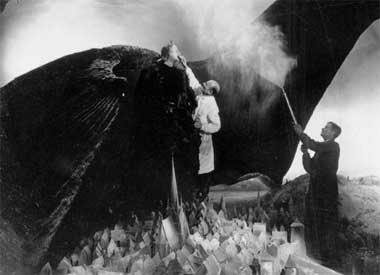
Sometimes called Formalism, the impulse is contrasted with Realism. It's worth keeping in mind that Realism is a style too. Realistic films attempt to reproduce the surface of reality with a minimum of distortion. The illusion is that their film world is unmanipulated, but even selectivity itself is a crafting of the art. However unobtrusive, Realism is still a style; but the interest is in what's being shown, the content, rather than the created effect, the form.
Similar to their counterparts in the art world, Expressionist directors are concerned more with an unabashedly subjective experience of reality, not how others might see it. Psychological or spiritual truths they feel can best be conveyed by distorting the surface of the material world. This reforming of reality can involve a high degree of manipulation, and the emphasis here is on the form rather than the content, at least as compared to Realism.
Expressionists reject tradition and turn away from realistic representations of nature and accepted concepts of beauty. The Expressionist artist is concerned with the visual projection of his emotional experience. Expressionist works typically convey an urgency. The desire of the Expressionist artist for self-knowledge and comprehension of the meaning of existence in its loneliness, horror, and threat of death can be compared to parallel trends among the Existentialists.
At a low point for Germany as a nation, a burst of effective Expressionist filmmaking emerged:
The Cabinet of Dr. Caligari (1919)
Fritz Lang was to have directed this film but was called away to another project. Warm's sets derive from his creed: "Films must be drawings brought to life." It's a madman's paranoid world, crooked and irregular. As in Nosferatu, the themes include somnambulism, diabolical power, madness, and mass murder.
Some nice Bibi has discovered a bunch of German expressionism movies ready to enjoy on Internet archive and google video:
 F.W. Murnau prepares Emil Jannings for a scene from Faust
F.W. Murnau prepares Emil Jannings for a scene from Faust- Faust, the F. W. Murnau's masterpiece (both on the Internet Archive and Google Video.
- Nosferatu, another Murnau's classic is available at Archive and google and as torrent.
- The Golem: 1915 version and 1920 version.
- The Cabinet of Dr. Caligari (internet archive and google video)
- Fritz Lang's M. (Google video and internet archives)
- Destiny, by Fritz Lang again on google video.


1 comment:
Modernistic World Needs Modern Art and here is the best Art Work On Canvas I have Ever Seen....!!!
Modern Art Painting On Canvas!
Post a Comment